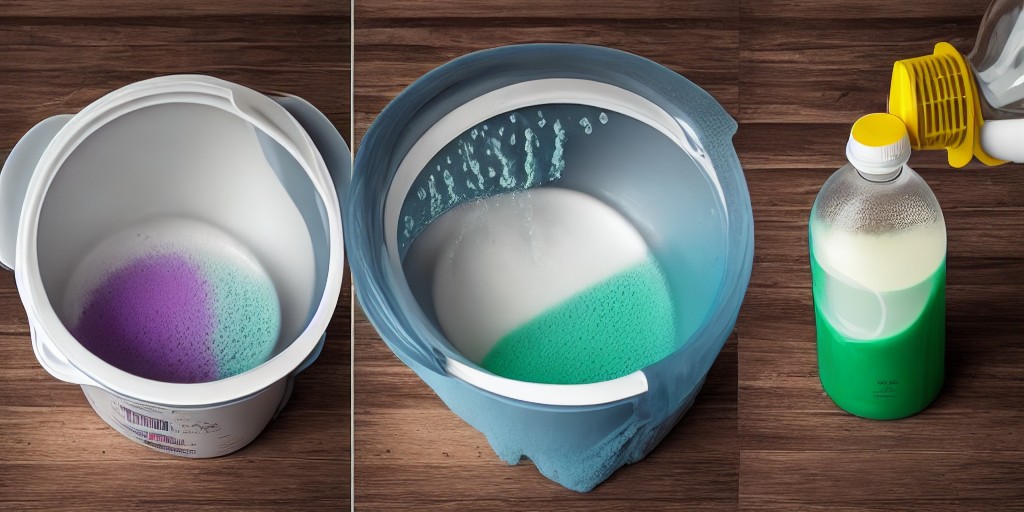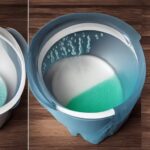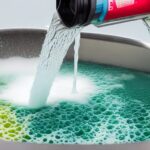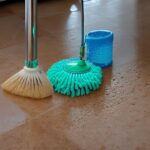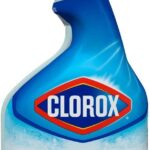Are you wondering what happens when you mix Lysol and Clorox? Perhaps you’re considering combining these two popular cleaning products to achieve better results. Before you do, it’s important to understand the potential risks and consequences.
In this article, i will discuss the effects of mixing Lysol and Clorox, why it’s dangerous, and what to do if you accidentally mix them. I will also explore alternative cleaning methods and provide tips for keeping your home safe and clean.
Cleaning and disinfecting have become more important than ever in recent years, especially with the advent of COVID-19. Many people are using cleaning products like Lysol and Clorox to keep their homes and workplaces clean and free of germs.
While these products are effective on their own, some people may wonder if they can get even better results by mixing them. Unfortunately, mixing Lysol and Clorox can be very dangerous and should be avoided at all costs.
What is Lysol?
Lysol is a brand of cleaning and disinfecting products that have been around for over a century. They offer a variety of products, including sprays, wipes, and cleaners, that are designed to kill germs and viruses.
Lysol products contain a variety of active ingredients, including ethanol, hydrogen peroxide, and quaternary ammonium compounds (quats). These ingredients work together to kill a wide range of bacteria and viruses.
What is Clorox?
Clorox is another popular brand of cleaning products that are designed to kill germs and viruses. They offer a variety of products, including bleach, wipes, and cleaners, that are used in homes and businesses around the world.
Clorox products contain sodium hypochlorite, which is a powerful disinfectant that can kill a wide range of germs and viruses.
Can you mix Lysol and Clorox?
No, you should never mix Lysol and Clorox. These products contain different active ingredients that can react with each other, creating a dangerous chemical reaction.
Why is it dangerous to mix Lysol and Clorox?
Mixing Lysol and Clorox can create a dangerous chemical reaction that releases chlorine gas. Chlorine gas is a highly toxic gas that can cause a range of health problems, including coughing, breathing difficulties, and even death in severe cases.
In addition to releasing chlorine gas, mixing Lysol and Clorox can also create other harmful compounds that can damage surfaces and cause other health problems.
What happens when you mix Lysol and Clorox?
When you mix Lysol and Clorox, you create a chemical reaction that releases chlorine gas. This gas can cause a range of health problems, including coughing, wheezing, and shortness of breath. In severe cases, it can even cause death.
In addition to chlorine gas, mixing Lysol and Clorox can also create other harmful compounds, such as chloroform and hydrochloric acid. These compounds can damage surfaces and cause health problems
What should you do if you accidentally mix Lysol and Clorox?
If you accidentally mix Lysol and Clorox, it’s important to take immediate action. If you’re experiencing symptoms like coughing, wheezing, or shortness of breath, leave the area and get fresh air immediately.
If you’re not experiencing symptoms, but you’ve mixed the products, you should still leave the area and ventilate the space. Open windows and doors to let fresh air in, and avoid breathing in the fumes.
It’s important to note that if you’re experiencing severe symptoms or have inhaled a large amount of fumes, you should seek medical attention immediately.
How can you safely clean your home?
To clean your home safely, it’s important to use cleaning products as directed and avoid mixing them with other products. Follow the instructions on the label, and use the products in a well-ventilated area.
If you’re looking for alternatives to Lysol and Clorox, there are plenty of other products on the market that are safe and effective. Look for products that are labeled “green” or “eco-friendly,” as these are typically safer for both you and the environment.
You can also make your own cleaning products using simple ingredients like vinegar, baking soda, and lemon juice. These products are effective and safe, and can be a great alternative to harsh chemicals.
Alternatives to Lysol and Clorox.
If you’re looking for alternatives to Lysol and Clorox, there are plenty of options available. Some popular alternatives include:
Seventh Generation: This brand offers a wide range of cleaning products that are safe and effective.
Method: Method offers a variety of cleaning products that are made with natural, biodegradable ingredients.
Mrs. Meyer’s: Mrs. Meyer’s products are made with plant-derived ingredients and are free from harsh chemicals.
Tips for keeping your home clean and safe.
In addition to using safe cleaning products, there are other steps you can take to keep your home clean and safe. Some tips to consider include:
- Wash your hands regularly: Hand washing is one of the most effective ways to prevent the spread of germs and viruses.
2. Disinfect high-touch surfaces: Use disinfectant wipes or sprays to clean high-touch surfaces like doorknobs, light switches, and countertops.
3. Keep your distance: If you’re around others who are sick, try to keep a safe distance to avoid getting sick yourself.
4. Stay home when you’re sick: If you’re feeling unwell, stay home to avoid spreading germs to others.
Conclusion.
Mixing Lysol and Clorox can be a dangerous mistake that can lead to serious health problems. It’s important to use cleaning products as directed and avoid mixing them with other products. If you’re looking for safe and effective cleaning alternatives, there are plenty of options available on the market.
Remember to always take precautions to keep your home and yourself safe, especially during times of illness and disease outbreaks.
FAQs on What Happens If You Mix Lysol and Clorox
Can mixing Lysol and Clorox be fatal?
Yes, mixing Lysol and Clorox can release chlorine gas, which can be fatal in high concentrations.
What are the symptoms of chlorine gas exposure?
Symptoms of chlorine gas exposure include coughing, wheezing, shortness of breath, chest pain, and nausea.
Are there safe alternatives to Lysol and Clorox?
Yes, there are many safe alternatives to Lysol and Clorox, including Seventh Generation, Method, and Mrs. Meyer’s.
Can you mix different types of Lysol or Clorox products?
No, you should never mix different types of cleaning products , even if they are from the same brand. Mixing different products can create toxic fumes and cause serious health problems.
What should you do if you accidentally mix cleaning products?
If you accidentally mix cleaning products, you should leave the area immediately and ventilate the space. Open windows and doors to let fresh air in, and avoid breathing in the fumes. If you’re experiencing severe symptoms or have inhaled a large amount of fumes, seek medical attention immediately.
Can you make your own cleaning products?
Yes, you can make your own cleaning products using simple ingredients like vinegar, baking soda, and lemon juice. These products are effective and safe, and can be a great alternative to harsh chemicals. There are many online resources that provide recipes for making your own cleaning products.
